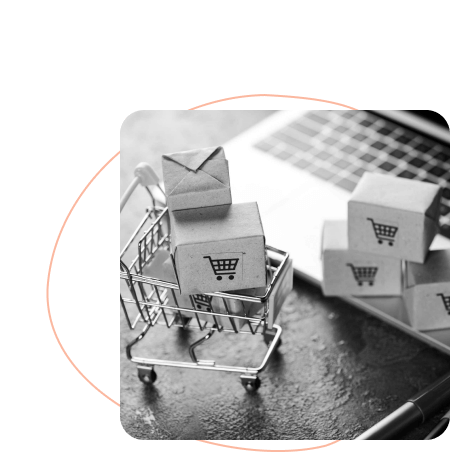
Transforming your retail business into an omnichannel model with an eCommerce platform is now expected of retailers of all sizes and product types. The attractiveness of online shopping has accelerated year by year, as businesses implement better service and convenience for online shoppers. Launching an eCommerce platform is a relatively simple first step, but the difficult part is managing everything with an eCommerce ERP. Without optimizing your processes, you could be losing many customers and profits.
An ERP solution designed specifically for retail eCommerce businesses will help you optimize processes and give you better visibility over your business. A modern ERP can include process improvements, data collection and analysis, and system integrations that help your omnichannel retail business thrive. Below, we will cover the top six benefits of a cloud eCommerce ERP.
1. Increased Efficiency
While manual data entry and data calculations are doable as a small business, any increased influx of orders will cause your system to fall apart. Cloud-based solutions like Acumatica ERP enables real-time synchronization of data between all connected systems. This eliminates the need for manual entry of duplicate data from one system to another. Any data updates completed in one system will automatically be updated in the other system, ensuring that everyone is on the same page. Reducing admin work with automations and data syncs helps save time, cut costs, reduce errors, and improve team morale.
2. Shipping and Handling Improvements
With an interconnected ERP, you can offer more shipping options to your eCommerce customers. Offering shipping with different delivery times, costs, handling, and warranty allows you to provide options to match the differing demands of your diverse customer base. Acumatica’s native integration with ShipEngine brings over 30 different global shipping carriers to help you ship orders within Canada or internationally. This integration helps eCommerce businesses print shipping labels, track packages, and calculate international shipping costs, all within your eCommerce ERP. Keeping all the information in one place also helps you better oversee unique shipping cases, and be notified of errors and warnings quicker.
3. Stronger Decision-Making Power
Many small eCommerce businesses sustain themselves with an assortment of systems to address their operational and management needs, which can include accounting, inventory, warehousing, shipping, payment processing, CRM, HCM, and vendor management. However, while all these dedicated systems have their own tools for analytics, it is ultimately unreliable information without taking in consideration data from other parts of your business. An advanced eCommerce ERP acts as a hub for all the integral eCommerce systems, and will produce real-time reports and dashboards, with helpful visuals.
4. Accounting Automation
Month-end closes will become increasingly difficult to manage as your eCommerce business expands with more product lines and channels. Advanced ERP solutions with built-in accounting tools automate the entire process. Vendor invoices and sales orders are automatically recorded in your eCommerce ERP and accounting system. This greatly reduces the time needed to perform your month-end close and ensure compliance to GAAP and IFRS. Moreover, your ERP can give you better visibility and reporting capabilities for financial decision-making.
5. Omnichannel Retail Management
Running multiple sales channels requires different systems for POS, marketplace selling, delivery, and more. By connecting all the systems into one hub, not only is data always up-to-minute, it makes managing the business as a whole a lot easier. Many customers will not shop on just one channel, so making sure data is consistent across channels is key. For example, some customers may make an online order and wish to pick it up at their closest store; smart functions in Acumatica help you perform these order transfers with one click.
6. On-Demand Customer Service
eCommerce shoppers expect the same level of service as in-store shopping, including being able to see their order records and contact support whenever they need. Acumatica has an easily configurable customer portal that can be directly implemented to your eCommerce site and connected to your eCommerce ERP. This way, data on customer orders and preferences can be made fully available to the customer, so they don’t have to contact customer service just to view their order details or make profile preference adjustments.
Want to see how an eCommerce ERP can transform your business?
Contact us for a free ERP demo
Related Resources


The Ultimate Guide for Mastering Inventory Valuation and Manufacturing Costing
Read the Article
